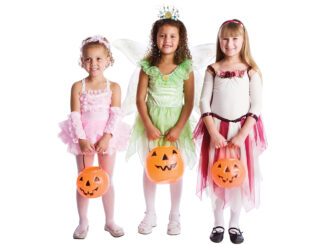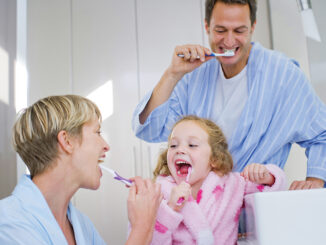
As a pediatric dentist and mom of four, I hear the comment that “they are just baby teeth” a lot. This month, I want to shed some light on how important those tiny little teeth actually are. Baby teeth are not just “throw-away” teeth for the tooth fairy. They help children speak clearly and chew naturally and they also help guide the developing permanent teeth into the correct position. Children have the same ability as adults to feel pain and discomfort from their teeth. When a child has a cavity in a baby tooth, the child can feel pain but they may not be able to say what is hurting them. Instead, they can become irritable, wake up at night, not eat properly and may act out.
The Mayo Clinic describes cavities as permanently damaged areas in the hard surface of your teeth that develop into tiny openings or holes. This is a multi-factorial process. Brushing is just one part of preventing cavities. It is also important to be aware of what foods and drinks your child has access to. Frequent snacking and sipping on sugary drinks increases your child’s risk of decay. Be aware of sources of snack food and sugary treats. If your child has access to sugary rewards at school, you may want to consider providing alternative treats or add in another round of brushing and fluoride rinsing when the child comes home from school.
Decay in baby teeth can be a hidden process, since it is occurring inside a child’s mouth and is not easily seen by parents. Your child’s dentist can help you differentiate between tooth stains that do not need treatment and actual cavities that do need dental treatment. Dental X-rays can help you see the developing permanent teeth in the area underneath the baby teeth. X-rays can also help the dentist see cavities on areas of the teeth that are not possible to see visually in the mouth.
Although most cavities in baby teeth start in the pits and grooves of the teeth, some children are more susceptible to cavities on the smooth surfaces of their teeth. A common area for very young children to get cavities is on the front and back surface of their front teeth. I see this most often when kids are put to bed with their bottle. When they drink from the bottle at night, the child is lapping their front teeth with sugary substrates all night long. The bacteria feed on these milk sugars and produce acid. This acid can attack the smooth surfaces of baby teeth and start to cause cavities or holes. Sometimes it is hard to notice this process until a child falls and hits their front tooth. A tooth weakened by unseen cavities can then crumble, leaving little left for the dentist to be able to fix.
Every parent makes choices for their children. Your child’s dentist can help you understand the importance of baby teeth and how you can prevent cavities for your child. We can work together to give your child the best chance at a lifetime of healthy smiles!
“Five Facts About Baby Teeth”
- There are 20 baby teeth, typically called “A through T” by the dentist.
- Cute gaps between baby teeth are great! They help make up for the difference in size between baby teeth and permanent teeth.
- The first teeth to appear are usually the lower front incisors around six months old.
- Baby teeth have thinner enamel and appear whiter than permanent teeth.
- That is another reason why cavities may progress more quickly in baby teeth.
-by Dr. Mandy Ashley
About Our Dentists: Dr. Mandy Ashley and Dr. Madison Galloway are Board Certified Pediatric Dentists proud to serve the communities of Bowling Green, Hopkinsville, and Glasgow! We look forward to sharing our vision of excellent comprehensive dental care that is fun for children and people with special healthcare needs with your family.
SKY Pediatric Dentistry has been providing dental care to children and adults with special needs since 2013. As board-certified specialists in dentistry for children, our team strives to make going to the dentist as fun as possible while maintaining high-quality treatment and preventative measures. We tailor treatment plans to each child and offer a wide range of treatment options, including sedation, in-office general anesthesia, and also hospital-based dentistry. With over 25 YEARS of doctor experience, SKY Pediatric Dentistry is a great choice for children’s dental care in Bowling Green, Hopkinsville, and Glasgow!




